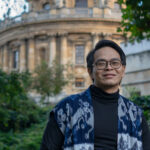
“As an astronaut, I spacewalked 220 miles above the Earth. Floating alongside the International Space Station, I watched hurricanes cartwheel across oceans, the Amazon snake its way to the sea through a brilliant green carpet of forest, and gigantic nighttime thunderstorms flash and flare for hundreds of miles along the Equator.
“From this God’s-eye-view, I saw how fragile and infinitely precious the Earth is. I’m hopeful for its future.”
This captivating description of our planet by British-born climate scientist Piers J. Seller has been printed and reprinted countless times since it first made publication in The New York Times last January. Seller loved his planet and wanted so badly to protect it, and his legacy has taught us that to improve mankind’s stewardship of the planet, we must remain dogged in our pursuit of new knowledge.
And that’s why research forms the bedrock of so many forward-leaning educational institutions of today, such as Seller’s alma mater, the University of Leeds (UoL). In fact, it was from this globally-renowned University that Seller kicked off his career, with a doctorate in biometerology which he earned in 1981.

As an esteemed member of the prestigious Russell Group, study of any subject at UoL is research-driven, which means students get front-row seats to the development of groundbreaking initiatives that go on to bring real impact to the world.
UoL also received a Gold rating in the Teaching Excellence Framework, demonstrating commitment to world-leading research that benefits not just the UK, but virtually every global region.
“Leeds is committed to working across disciplines to help tackle global challenges,” the University states on its website, also outlining an extensive multi-disciplinary research portfolio that covers areas such as sustainable cities, energy, climate, culture, food, health and water.
To produce tomorrow’s global thinkers, UoL attracts some 7,000 international students every year, making its campus community diverse and international. Today, UoL’s alumni extends to 250,000 people across over 140 countries.
The University’s global outreach doesn’t end there. UoL also opens its doors to scholars from abroad through key partnerships with external funding bodies. Those keen on pursuing their Masters or PhD study at UoL, for example, can seek funding opportunities from a host of scholarship programmes, which include CONACyT in Mexico, CONICyT in Chile, COLFUTURO in Colombia and BEC.AR in Argentina.
Laura Nemeth from Argentina is one such applicant. The nutritionist, one of 18 students in the inaugural batch of scholars under the BEC.AR scheme, is currently pursuing her Masters in Food Quality and Innovation at UoL.

Nemeth says she studied food science in Buenos Aires University and went on to work in the retail and food sector after, but decided later than an international education was necessary to advance her career in an increasingly globalised world.
“I picked this course because I am interested in how innovation can drive development. Innovation in the food industry is particularly exciting because it’s so fast-moving with new products being introduced all the time…. I would love to use the knowledge I gain from studying in Leeds to help an Argentinian business become more competitive in the global market. I think my course will make me stand out and help me think in a new way,” she says.
Hervin Fernández-Aceves is undertaking a PhD in Medieval History. According to the Mexico-born CONACyT scholar, when he was searching for an expert to supervise his idea for a research project, UoL’s Institute for Medieval Studies emerged as one of the top schools in the world in his field of interest.
“I decided to conduct my doctoral research here in Leeds because of the expertise of supervision and the library resources,” he explains.
Loreto, a Chilean student doing her PhD in education, says UoL’s holistic, research-focused approach to teaching, and its team of dedicated educators helped her immensely in the course.
“My PhD explores teacher trainers’ beliefs and practices in the context of curriculum innovation. My supervisors have guided my research closely from the very first day, and I have felt well-supported by them, the school of education and the wide number of development workshops offered by the university.”
On top of that, the city of Leeds itself adds to the UoL experience. Energetic yet quaint, it offers a variety of architectural styles from the Georgian to the Victorian and the 20th and 21st century era. The West Yorkshire city has in years past received several tourism accolades, and this year it has been ranked 5th on the Lonely Planet Best in Europe 2017. It is also a known student centre that is famous for its shopping and nightlife.
Its major attractions include the Royal Armouries, the Henry Moore Sculpture Centre, West Yorkshire Playhouse and the award winning Harewood House, to name a few.
Luis Ross, a Mexican native and student of Leeds’ MSc in Transport Planning programme – another hard-earned recipient of the sought-after CONACyT funding – says:
“Leeds is a truly international and diverse city; thus you can find a wide range of activities to participate in when you are not studying. One of my favourite places is definitely the Hyde Park Picture House which offers an exclusive catalogue of films and has special prices for students.
“The city also had good connections to other major cities including London and Edinburgh as well as being close to Manchester Airport.”

UoL recognises the importance of fostering entrepreneurship in students, encouraging students to hone the research skills necessary to thrive after graduation, not just for those studying research-based subjects, nor just those undertaking a PhD, but every student. And as the icing on the cake, Leeds’ reputation for outstanding education and the eclectic mix of culture, nightlife, opportunity and entertainment, make it the ideal place to live and study.
Follow UoL on Facebook, Twitter, Instagram, YouTube and LinkedIn
Liked this? Then you’ll love these
The student guide to studying Politics & International Studies
7 reasons to study Politics and International Studies at the University of Leeds







